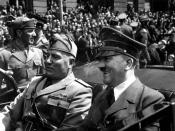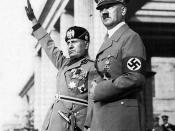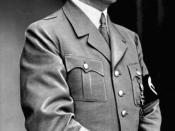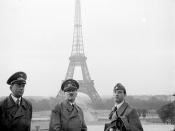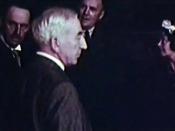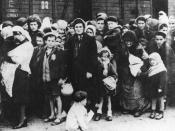When someone hears the name Adolf Hitler, the first things that comes into their mind is probably hate. He was known as many things in his day but the one thing that stands out over everything else is the Holocaust. To better understand why Hitler disliked and entire race you have to break it down. First off the word anti-Semitism comes to mind. That is known as hostility towards or prejudice against Jews. (Dictionary) Deicide may also be associated with Hitler. Deicide is the killing of a God or religious symbol. This resembles Hitler's actions in that he was trying to get rid of anyone who worshiped God through Judaism.
Adolf Hitler was born in 1889. He spent most of his early life in a town called Linz, Austria. This is where most of his racist type attitudes were developed (Weiss 191). Weiss further states, "There and in Vienna Hitler witnessed the most extreme racist turmoil in Europe and adopted political attitudes similar to those of a majority of middle-class Austrians" (191).
Hitler's father was a heavy drinker and very active in politics. Weiss believes, "Young Adolf must have heard much loud and angry talk about inferior Slavs and traitorous Jewish Liberals (191-192). This is one of the reasons many people believe that Hitler was the way he was. If you grow up around something your whole life that usually reflects who you are. His father may also be the reason why Hitler was so violent. "His father constantly harassed Adolf and evidently beat him often; his older brother fled home because of the father's irrational furies" (Weiss 192).
One of the biggest problems Hitler had with the Jewish people was that he thought they were not pulling their weight. Goldhagen quotes Hitler saying, "Work [for Jews] consisted once of plundering traveling caravans, and today it consists of plundering indebted farmers, industrial, middle-class people, etc. The forms did change, all right, but the principle remained the same. We do not call it work but robbery" (281). This more than likely comes from his younger years in that he witnessed Jewish rebels taking food from innocent farms (Goldhagen 282). This lead to him being angry with the Jews later in life. The Jewish work ethic fell very short of Hitler's. Hitler believed that work should be done to help the common good of the nation (Goldhagen 285-286). He saw Jewish work as selfish and only for their own common good (Goldhagen 285-286). After a few years Hitler decided that the Jews just didn't do work good enough, even after he forced them to do it the way he saw fit. Goldhagen states, "The dominant policy was not to put Jews to work, but to prevent them from working" (288).
Hitler felt that the Jewish people and German people could never live together in harmony. He saw the Jews as a threat to his uprising so he had to have an excuse to get rid of them. It is hard to believe but Hitler was never seen as the most racist leader. Most of the head Nazi's thought that Hitler was going easy on the Jew's and that he needed to be more forceful. Goldhagen states, "Many of Hitler's followers thought he was exaggerating when he said they would have total extermination of the Jew's" (134). Hitler had tow main objectives with the Jewish people. The first was "To turn the Jews into "socially dead" beings bb beings that were violently dominated, naturally alienated, and generally dishonored-- and, once they were, to treat them as such" (Goldhagen 135). Two, "To remove the Jews as thoroughly and permanently from social and, as far as possible, from physical contact with the German people, and thereby to neutralize them as a factor in German life" (Goldhagen 135).
Hitler's hate for the Jews grew as the years progressed. Goldhagen states, "Hitler felt 'inactive' when it came to the Jews⦠him saying this could have only meant 'abstinence from mass killing,' since for eight years Hitler had been very active indeed against the Jews, persecuting them, degrading them, burning their synagogues, expelling them from Germany, herding them into ghettos, and even killing them sporadically. For him these actions fell short of his common goal, the physical annihilation of the Jews" (423). Some feel that Hitler's attitude towards everything not being good enough for him (even himself at times), lead him to become frustrated with the Jews and, to him, their lack of ability.
Another reason for Hitler to not like the Jews was the fact that he blamed them for what was happening to Germany in the war (Goldhagen 424). He said that the Jews were the main reason they were even in the war (Goldhagen 424). He used the prisoner pf war camps as a campaign against the Jews, saying that the reason German troops were in those camps was because of the Jews (Goldhagen 424). People started believing these lies Hitler was coming up with, that's hwy he had so many people supporting him (Goldhagen 87). It was said that Hitler's army grew from 400,00 to 2 million in six months of his campaigning (Goldhagen 87).
Many historians believed that the reason Hitler hated the Jewish population was because he was scared of them. Svoray and Taylor state, "Hitler was intimidated by the Jews because they usually had a lot of money and power" (187). "Hitler was known for his temper, and despite outward appearance, he was a weak scared person, lacking personal courage, who never visited the front, staying behind in comfortable conditions" (Svoray & Taylor 188). "He was always guided by his passions and emotions or rather by his inner tensions and conflicts" (Svoray & Taylor 188). "Hitler never visited bombed out German cities, he always traveled at night in a limousine with tightly drawn curtains" (Svoray & Taylor 188). All of these qualities of Hitler lead people to believe that he had no confidence in his purpose.
Hitler had a dream of a perfect world, the Jewish people did not agree with what he was thinking so they started to rise against him (Svoray & Taylor 107). This was a rude awakening, he knew he had to get rid of them, besides they were never apart of his plan anyway (Svoray & Taylor 108). Hitler wanted to rule over the world and have it be his Utopia (Svoray & Taylor 108). In fact this is exactly what he was trying to do.
Hitler wanted the world to fit the mold that he called "the perfect human race." Unfortunately everyone is born different so that put a huge damper on his plan. The perfect being consisted of blonde hair blue eyes, muscular, and no abnormalities. Most all Jewish people in this time period had dark hair, brown eyes and were kind of short. Although Jewish people were not his only targets in this killing spree. He killed people that were paralyzed, missing limbs, and even babies that were born with abnormalities (Weiss 354). Weiss states, "He would have probably killed his own child if it was not born to his satisfaction" (Weiss 354).
The belief that Hitler was trying to make a perfect society isn't far stretched. He lived a rough life growing up. He even wrote a book called "My Struggle," it was a book about his life before he became a military leader. Noting that his life was rough to begin, someone could see why he would want the rest of his life to be perfect. The fact that he was a powerful speaker was what got him a lot of positive support. He could make a none believer into a believer, on just about anything. This is why many people sided with him in the fight against the Jewish population.
"It seems that those Jewish Germans who enlisted voluntarily and made efforts to remain in uniform even after their Jewish origins came under scrutiny by the authorities" (Smith 1). Some of the Jewish population still wanted to help Germany win the war, but at the same time Hitler was saying they were no help at all (Smith 1). Many Jews tried to make uprisings to over take Hitler of even convince people he was wrong. Smith says, "Rabbi Schneerson was the leader of the most ultra-orthodox Jews, he was severely hated by Hitler and Hitler even caught him and tried to kill him but a half-Jewish soldier saved him" (2). Historians still are not exactly sure why the Jewish people would actually side with Hitler after all the hatred he put on them.
It isn't easy to get in the mind of a person that most people see as a psycho. Hitler was often a misleading person filled with lies and deceit. His hate towards the Jewish race left millions of Jews without their lives. His belief in his fantasy world was too far fetched for anyone. No one will ever know exactly what made Hitler like to do the things he did. Whether it be a bad influence as a child or just the fact that he was scared of Jewish people, only one man knows for sure, and he killed himself.
Works Cited Goldhagen, Daniel Honah. Hitler's Willing Executioners. New York: Alfred A Knopf, 1996.
Smith, Bradley H. Hitler's Martial Jews. é1998. 20 April 2002. http://www.codoh.com/newsdesk/961200.html.
Svoray, Yaron., and Nick Taylor. In Hitler's Shadow. New York: Dell Publishing Group, 1994.
Weis, John. Ideology of Death: Why the Holocaust Happened in Germany.
Chicago: Ivan R. Dee, 1996
